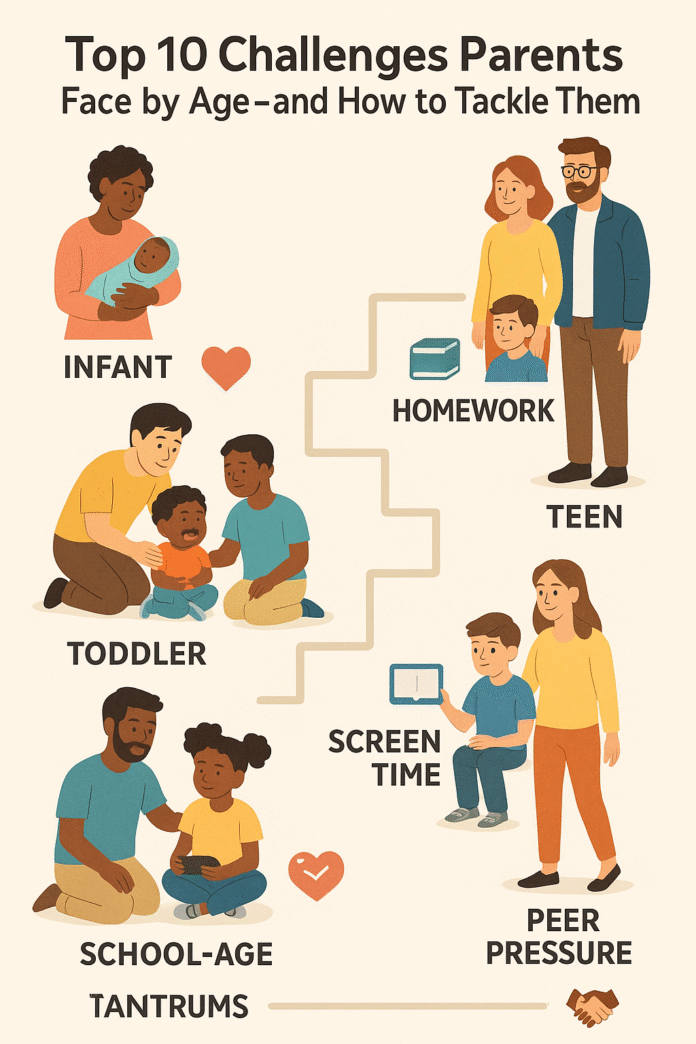Parenting is one of life’s greatest journeys—and toughest roles. Each stage of your child’s development presents new joys, but also distinct struggles that can leave parents feeling overwhelmed or unprepared. Whether you’re soothing a newborn or guiding a teenager, knowing what to expect—and how to respond—can make all the difference.
Here’s a breakdown of the top 10 parenting challenges by age, and how to handle them with confidence and care.
1. Infants (0–1 year): Sleep Deprivation & Identity Shift
Common Challenges:
-
Constant sleep disruption due to nighttime feedings and short sleep cycles.
-
Loss of personal time and identity, especially for new parents adjusting to 24/7 caregiving.
How to Tackle It:
-
Split night shifts with your partner or support person.
-
Join a parenting group to share experiences and reduce isolation.
-
Create small routines for self-care, even if it’s 10 minutes a day.

2. Toddlers (1–3 years): Tantrums & Boundary Testing
Common Challenges:
-
Frequent meltdowns when toddlers can’t express themselves verbally.
-
Defiance and saying “no” to everything as part of autonomy development.
How to Tackle It:
-
Use calm, consistent boundaries.
-
Offer limited choices to encourage independence without chaos.
-
Teach basic emotion words like “sad,” “mad,” or “tired” to help them express themselves.
3. Preschoolers (3–5 years): Emotional Regulation & Social Skills
Common Challenges:
-
Difficulty sharing and playing cooperatively with others.
-
Trouble managing big emotions and disappointment.
How to Tackle It:
-
Model empathy and teach through play.
-
Use picture books and role-play to introduce social problem-solving.
-
Recognize their feelings but guide them toward appropriate behavior.

4. Early School Age (5–7 years): School Adjustment & Friendships
Common Challenges:
-
Anxiety about school routines, new rules, and expectations.
-
Navigating first friendships and possible exclusion.
How to Tackle It:
-
Practice morning routines before school starts.
-
Ask open-ended questions about their day to foster communication.
-
Encourage activities like team sports or clubs to improve peer relationships.

5. Preteens (8–12 years): Peer Pressure & Identity
Common Challenges:
-
Feeling pulled between fitting in and staying true to themselves.
-
Starting to push boundaries and seek independence.
How to Tackle It:
-
Foster open communication and emotional availability.
-
Teach media literacy and decision-making skills.
-
Help them discover hobbies or passions to build confidence.

6. Teenagers (13–18 years): Independence & Risk-Taking
Common Challenges:
-
Increased desire for privacy and autonomy.
-
Exposure to risky behaviors like substance use or peer pressure.
How to Tackle It:
-
Balance freedom with boundaries.
-
Talk about topics like mental health, consent, and online safety before they become issues.
-
Respect their privacy but stay involved through regular check-ins.
7. Young Adults (18–22 years): Launching Into Adulthood
Common Challenges:
-
Struggles with financial independence and time management.
-
Emotional challenges from living away or starting work/college.
How to Tackle It:
-
Encourage budgeting apps or classes.
-
Offer support, not solutions—let them lead, but know you’re a safe landing zone.
8. Adult Children (22+ years): New Boundaries & Grandparenting
Common Challenges:
-
Accepting differences in values, career paths, or lifestyles.
-
Navigating your role as a grandparent or continued caregiver.
How to Tackle It:
-
Respect their independence, even when you disagree.
-
Support their parenting choices—don’t interfere unless asked.
9. The Digital Age: Screen Time & Cyber Risks
Common Challenges:
-
Overuse of screens and devices.
-
Dangers of social media, cyberbullying, and exposure to inappropriate content.
How to Tackle It:
-
Use parental controls, screen time schedules, and family tech contracts.
-
Stay educated on apps your child uses and model healthy tech habits.
10. Lifelong Parenting: Evolving Roles Over Time
Common Challenges:
-
Struggling with the “empty nest” phase.
-
Being needed emotionally or financially in unexpected ways.
How to Tackle It:
-
Focus on personal goals or hobbies that may have been paused.
-
Shift from “manager” to mentor as your parenting role evolves.




